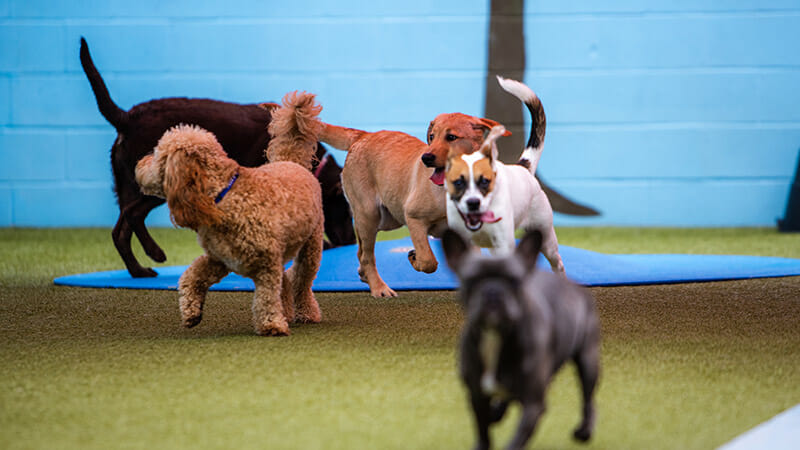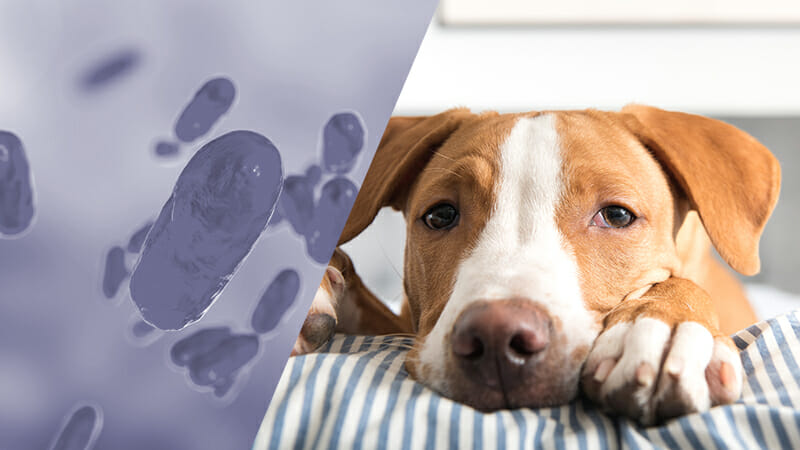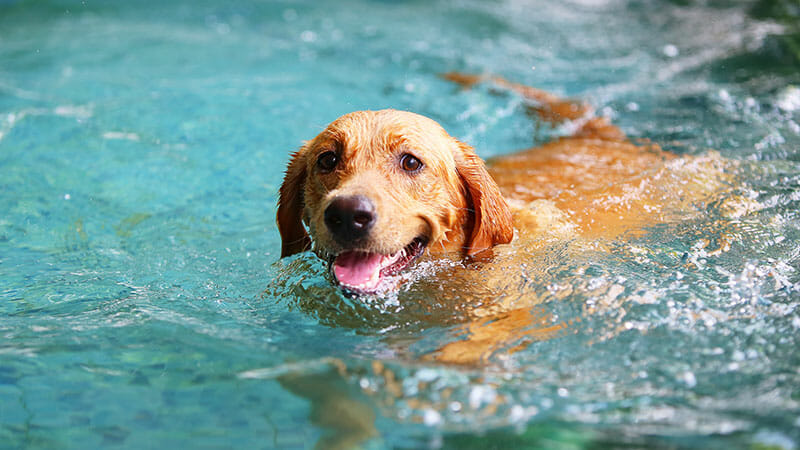You just got a puppy, or maybe you adopted an adult dog from the shelter, and they’re about to embark on their first dog boarding experience. If you want to make sure their stay goes as smoothly as possible, follow the tips below. We’ll tell you what to do to prepare, how to pack, and how to make sure your dog is ready for the experience!
Make Your Puppy’s (or New Dog’s) Health the Priority
If you have a young puppy or a newly adopted dog that’s still in the process of getting all their vaccinations and necessary boosters, you’ll need to wait to board them until that process is complete and your vet gives the okay. Keep in mind that the average minimum age requirement for boarding puppies is three months—as long as they’ve completed their regimen of puppy shots.
If you have any concerns about boarding your puppy, check with your vet. If they have other health concerns, it’s good to educate yourself so you can pass that knowledge on to the staff at the boarding facility. Make sure to let them know if your pup requires meds during the day, or if they’ll need some extra time to rest or more frequent potty breaks.
Safe and reputable boarding facilities will stand by their rules. If they have a minimum age requirement for the puppies they accept and require vaccination records, that’s a good sign. It might be inconvenient for you if your puppy doesn’t yet meet those requirements, but it shows that the boarding facility takes the health of their dogs seriously. If they say they’re willing to make an exception for your puppy, it probably isn’t the only exception they’ve made, and you could risk exposing your pup to contagious illnesses.
Remember to Pack These 8 Items
1. Documents the Boarding Facility Requires
Most often, these documents include:
- Completing appropriate forms
- A registered account
- Proof of vaccination
- Medical records
If you have questions about the specific documents your boarding facility requires, check their website or give them a call.
2. ID Tags
Make sure your pet’s identification info is up to date before you leave them at the boarding facility. Your pup’s collar should include an ID tag that has your phone number, at the least. Having your puppy microchipped and checking that the contact information is accurate is also a great idea.
3. Emergency Contacts
If you’re going out of town, make sure to give the boarding facility emergency contact information. This could include:
- The name and phone number of a local friend or family member who can care for your puppy if there’s an emergency at the boarding facility.
- Your regular veterinarian’s name, address, and phone number.
- A local emergency vet’s name, address, and phone number.
- A way to reach you in an emergency.
The more information you give the boarding facility, the better they’ll be able to react to an emergency.
3. Emergency Contacts
If you’re going out of town, make sure to give the boarding facility emergency contact information. This could include:
- The name and phone number of a local friend or family member who can care for your puppy if there’s an emergency at the boarding facility.
- Your regular veterinarian’s name, address, and phone number.
- A local emergency vet’s name, address, and phone number.
- A way to reach you in an emergency.
The more information you give the boarding facility, the better they’ll be able to react to an emergency.
4. Something to Remind Them of Home
This could be a familiar blanket or a shirt that smells like you. They’ll sleep with it at night, which can help them feel calm and stress-free instead of homesick.
5. Snacks and Toys
Make sure to pack one or two of your puppy’s favorite toys—they’ll provide a distraction if they ever start feeling homesick during their stay.
You can also pack your dog’s favorite treats and chew toys and ask the doggy daycare to give them the treat at the same time of day that you usually give them the treat. That little bit of routine will help your dog to feel more comfortable.
6. Plenty of Food
Make sure you pack enough of your puppy’s usual food to last the length of their stay—and then pack some extra, just in case. You can even separate each meal into labeled baggies to make it easier for the staff to feed or to ensure your puppy is getting the exact amount of food they’re used to getting during meal times.
7. Meds and Supplements
Common examples include salmon oil, yogurt, pumpkin, and other natural supplements that promote healthy joints and good digestion. Include the appropriate number of doses for your puppy’s stay, and be sure to include instructions for the staff.
For example, if your puppy needs daily medication, will they eat it outright, or do they prefer it with a little peanut butter?
8. Collar and Leash
Make sure you drop your puppy off with their collar and at least one leash. Sending an extra is always a good idea, just in case the first gets lost or chewed on.
How to Prep Your Puppy
Some puppies need very little prep for boarding because they’re adaptable—but, like some people, other puppies will need time to adjust to change. You can help to make that process go more smoothly by following these rules of thumb.
Start with a trial run. A trial stay of 24 hours at the boarding facility can help to ease your puppy into their new environment and daily routine before committing to a longer stay.
Pack something familiar. There’s no place like home, so if your puppy has a favorite blanket, rug, or toy, send it along so they have something familiar and comforting nearby.
Get them used to sleeping alone. If your puppy is used to sleeping with you, transition them to their own bed before their boarding stay.
Get the okay from your puppy’s veterinarian. Make sure your puppy is up to date on all of their vaccinations and flea and heartworm medications.
Drop your puppy off early. This will give them time to play, make friends, and tire themselves out before going to bed for the night.
Remember: Puppies Are Impressionable
Take your puppy’s personality into consideration, and pay attention to whether they become easily stressed around new dogs and unfamiliar people. Boarding can help with their socialization, but it could end up making your puppy more fearful in these situations if their initial experiences aren’t pleasant.
The length of time you plan to board your puppy should also be taken into consideration. Being away from your new pup overnight or for a couple of days shouldn’t have a huge effect on them, especially if they’re in a place that they feel safe and comfortable in and have plenty of opportunities to play and have fun. However, longer stays give your impressionable puppy more time to learn behaviors from other dogs, and they aren’t always going to be good behaviors. They might also have trouble readjusting to their routine at home.
Book Your Puppy’s Boarding Stay Early
To make sure you have plenty of time to get your puppy ready for their first boarding stay at your facility of choice, book in advance. We are committed to providing exceptional care to all of our four-legged guests! To learn more about the boarding services we offer, check out our website or call to schedule a tour. We look forward to meeting you and your new puppy!




